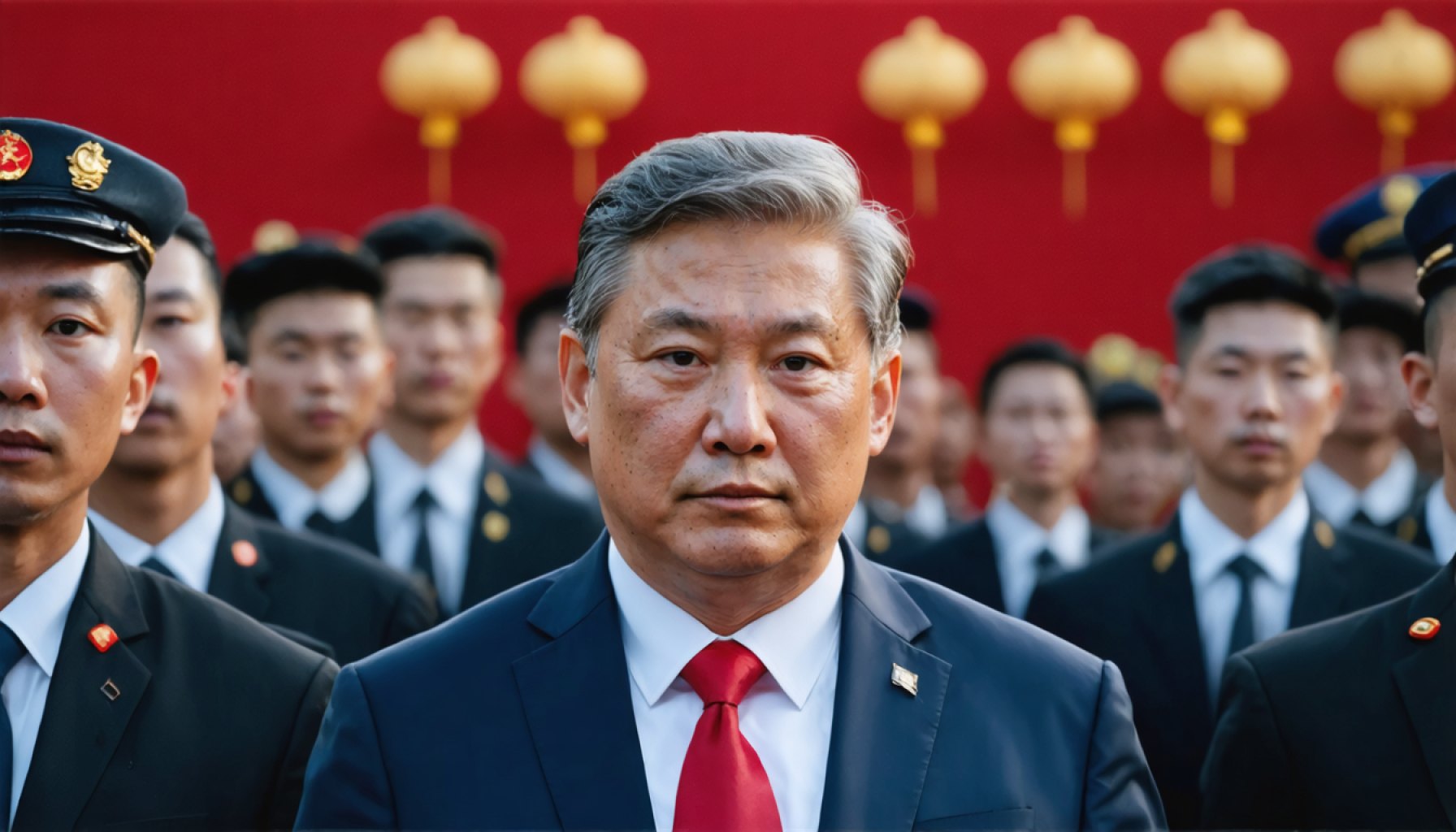- Jiang Chaoliang, a member of China’s National People’s Congress Standing Committee, is under investigation for severe disciplinary and legal violations.
- The Central Commission for Discipline Inspection’s probe highlights China’s ongoing crackdown on corruption within its government sectors.
- Jiang, previously held prominent roles such as Governor of Jilin Province and Secretary of the Hubei Provincial Party Committee, illustrating his significant political influence.
- This investigation serves as a reminder that no political position is immune from scrutiny under China’s strong stance on accountability.
- The unfolding case against Jiang symbolizes a broader narrative on power, justice, and reform within the Chinese political landscape.
A storm brews over China’s political landscape as a prominent official finds himself ensnared in allegations that could reshape his career. The Central Commission for Discipline Inspection announces an investigation into Jiang Chaoliang, a sitting member of the 14th National People’s Congress Standing Committee and the Deputy Director of the Agriculture and Rural Affairs Committee.
What stirs the intrigue is not just the accusations of severe disciplinary violations and legal infractions, but the shadow cast across Jiang’s distinguished history. Born in August 1957, Jiang Chaoliang has traversed significant political terrain, holding key roles such as Governor of Jilin Province and Secretary of the Hubei Provincial Party Committee. His trajectory seems a case study in Chinese governance, reflecting both the ascent and peril of political life in China.
The probe against Jiang marks another chapter in China’s relentless crackdown on corruption within its bureaucracy. The skies, once clear for Jiang, now cloud with the charged atmosphere of an investigation that puts powerful figures in check, echoing a broader narrative that has echoed across China’s media landscape.
For those watching from the sidelines, Jiang’s fall from grace underscores a critical takeaway: no position remains beyond scrutiny. The current climate across China’s government articulates a staunch message—accountability reigns supreme, and the campaign against corruption, unwavering. As the nation watches this saga unfold, the ripples of this inquiry may extend beyond one man’s fate, touching on broader themes of power, justice, and reform.
What’s Next for China’s Political Landscape Amid Corruption Crackdown?
How-To Steps & Life Hacks
Understanding China’s political scene requires navigating complex layers of Party protocols and power hierarchies.
1. Stay Informed: Follow credible news sources and journals focused on China’s politics.
2. Learn from Experts: Attend webinars or read books by political analysts specializing in Chinese governance.
3. Observe Social Media: Platforms like Weibo can offer insights, though they require awareness of censorship.
4. Engage with China Studies Programs: Universities and think tanks often have seminars that delve into current political climates.
Real-World Use Cases
Allegations like those against Jiang Chaoliang often serve as case studies in political science courses focused on real-world applications of governance, ethics, and legal systems. They demonstrate how internal Party discipline mechanisms are a major tool for maintaining control and enforcing Party line adherence.
Market Forecasts & Industry Trends
The ongoing corruption crackdowns may influence economic policies and investor confidence in China. According to economists, such reforms, if perceived positively, can stabilize market conditions by ensuring a fair business environment. Yet, they can also create short-term instability as industries adjust to new leadership dynamics.
World Bank
Reviews & Comparisons
In terms of governance models, China’s centralized, top-down approach starkly contrasts with democratic systems that spread power more evenly among institutions and the public. Comparisons with India or Western democracies highlight differences in accountability and transparency.
Controversies & Limitations
Critics argue that such investigations could be politically motivated, serving as a means for Xi Jinping’s administration to eliminate rivals and consolidate power. This ongoing tension raises questions about the line between genuine anti-corruption efforts and political purges.
Features, Specs & Pricing of Political Strategies
Anti-corruption campaign strategy often includes surprise audits, leveraging technology for transaction monitoring, and public trials to set examples. Contrastively, other nations may emphasize systemic institutional changes as part of their anti-corruption measures.
Security & Sustainability
The long-term sustainability of these crackdowns depends on broader institutional reforms. Without establishing independent judiciary bodies, the centralization of power may undermine the security and fairness of disciplinary measures.
Insights & Predictions
Experts predict continued internal reforms in China, but with an increasing emphasis on digital governance and surveillance to prevent corruption. The approach could see greater AI and big data use to preempt and identify fraudulent activities.
Brookings Institution
Tutorials & Compatibility
For those in academia or business trying to understand these dynamics, consider leveraging MOOCs (Massive Open Online Courses) in Chinese politics or international relations to gain a nuanced understanding.
Pros & Cons Overview
Pros:
– Accountability: Demonstrates commitment to eliminating corruption.
– Deterrence: Potentially reduces corruption in the long run.
Cons:
– Political Manipulation: Risk of these being used as tools for political gain.
– Instability: Could create short-term disruptions in governance or economic decisions.
Actionable Recommendations
– Leverage Trusted Insights: Regularly update your knowledge base on China’s political climate using industry reports and journals.
– Network with Experts: Join forums and groups focused on international politics to exchange insights and opinions.
– Academic Pursuits: Consider formal education avenues to understand deeper implications and historical context.
Staying ahead in understanding China’s evolving power dynamics requires continuous engagement and learning.
Council on Foreign Relations
 How Apple’s Dance with China’s Market Shifts the Global Tech Landscape
How Apple’s Dance with China’s Market Shifts the Global Tech Landscape  The Spark Behind Schenectady’s Electrifying Weekend: A Deep Dive into the Future of Cars
The Spark Behind Schenectady’s Electrifying Weekend: A Deep Dive into the Future of Cars  The Unseen Journey: How Aurora’s Self-Driving Trucks Are Paving New Roads in Freight
The Unseen Journey: How Aurora’s Self-Driving Trucks Are Paving New Roads in Freight  Epic Games’ Bold Move: Revolutionizing Developer Revenue with New Policies
Epic Games’ Bold Move: Revolutionizing Developer Revenue with New Policies  Lucid Group’s Wild Ride: Can Luxury EVs Thrive Amid Economic Uncertainty?
Lucid Group’s Wild Ride: Can Luxury EVs Thrive Amid Economic Uncertainty?  BYD’s Record-Breaking Feat: Revolutionizing India’s EV Landscape with Sealion 7
BYD’s Record-Breaking Feat: Revolutionizing India’s EV Landscape with Sealion 7  The Surprise Tesla Tax: Washington State’s Bold New Move Shakes EV Landscape
The Surprise Tesla Tax: Washington State’s Bold New Move Shakes EV Landscape  World’s Largest Car Carrier Sets Sail: A Game-Changer for Electric Vehicles
World’s Largest Car Carrier Sets Sail: A Game-Changer for Electric Vehicles  Why New Yorkers Are Hesitant to Pay for Clean Energy Despite Broad Support
Why New Yorkers Are Hesitant to Pay for Clean Energy Despite Broad Support 